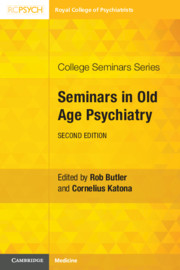Book contents
- Seminars in Old Age Psychiatry
- College Seminars Series
- Seminars in Old Age Psychiatry
- Copyright page
- Contents
- Contributors
- Preface
- Note
- Chapter 1 Healthy Ageing
- Chapter 2 Clinical Assessment
- Chapter 3 Cognitive Assessment
- Chapter 4 Imaging
- Chapter 5 Delirium
- Chapter 6 Alzheimer’s Disease
- Chapter 7 Vascular Dementia
- Chapter 8 Dementia with Lewy Bodies
- Chapter 9 Frontotemporal Dementia
- Chapter 10 Depression
- Chapter 11 Bipolar Disorder
- Chapter 12 Psychosis
- Chapter 13 Anxiety Disorders
- Chapter 14 Drug and Alcohol Misuse
- Chapter 15 Attention Deficit Hyperactivity Disorder
- Chapter 16 Medications
- Chapter 17 Electroconvulsive Therapy and Neurostimulation
- Chapter 18 Psychological Therapies
- Chapter 19 Role of an Old Age Psychiatrist
- Chapter 20 Consultation-Liaison
- Chapter 21 Palliative Care
- Chapter 22 Care Homes
- Chapter 23 Carers
- Chapter 24 Law, Capacity and Ethics
- Chapter 25 Migrants, Refugees and Asylum Seekers
- Chapter 26 Clinical Scenarios
- Index
- References
Chapter 19 - Role of an Old Age Psychiatrist
Published online by Cambridge University Press: 21 June 2019
- Seminars in Old Age Psychiatry
- College Seminars Series
- Seminars in Old Age Psychiatry
- Copyright page
- Contents
- Contributors
- Preface
- Note
- Chapter 1 Healthy Ageing
- Chapter 2 Clinical Assessment
- Chapter 3 Cognitive Assessment
- Chapter 4 Imaging
- Chapter 5 Delirium
- Chapter 6 Alzheimer’s Disease
- Chapter 7 Vascular Dementia
- Chapter 8 Dementia with Lewy Bodies
- Chapter 9 Frontotemporal Dementia
- Chapter 10 Depression
- Chapter 11 Bipolar Disorder
- Chapter 12 Psychosis
- Chapter 13 Anxiety Disorders
- Chapter 14 Drug and Alcohol Misuse
- Chapter 15 Attention Deficit Hyperactivity Disorder
- Chapter 16 Medications
- Chapter 17 Electroconvulsive Therapy and Neurostimulation
- Chapter 18 Psychological Therapies
- Chapter 19 Role of an Old Age Psychiatrist
- Chapter 20 Consultation-Liaison
- Chapter 21 Palliative Care
- Chapter 22 Care Homes
- Chapter 23 Carers
- Chapter 24 Law, Capacity and Ethics
- Chapter 25 Migrants, Refugees and Asylum Seekers
- Chapter 26 Clinical Scenarios
- Index
- References
Summary
The world’s population is ageing. In 2017, older people (i.e., those aged 60 years or over) account for 13% of the world’s population. With better treatment of communicable and non-communicable diseases, the global life expectancy at birth is projected to rise from 71 years in 2010–2015 to 77 years in 2045–2050. The number of older people in the world is projected to be 1.4 billion in 2030 and 2.1 billion in 2050, and could rise to 3.1 billion in 2100 [1]. The increase in the elderly population brings with it many challenges for nearly all sectors of the society, including labour and financial markets; demand for goods and services such as health services, housing, transportation and social protection; and changes in family structures and intergenerational relationships [2]. The World Health Organization estimated approximately 15% of older people aged 60 or over suffer from a mental disorder [3]; the most common mental health and neurological disorders are dementia and depression, which affect approximately 5% and 7%, respectively, of the world’s elderly population [3]. Mental health disorders in older people are associated with unique age-related medical and psychosocial factors such as frailty, increased dependency, retirement, widowhood, role changes, finances and environmental relocation [4]. People with severe functional psychiatric disorders, such as schizophrenia and bipolar disorder, who enter into old age often have complex medical and psychosocial needs. It has also been suggested that, compared with younger people, presentations in older age are often atypical [5].
- Type
- Chapter
- Information
- Seminars in Old Age Psychiatry , pp. 216 - 229Publisher: Cambridge University PressPrint publication year: 2019



